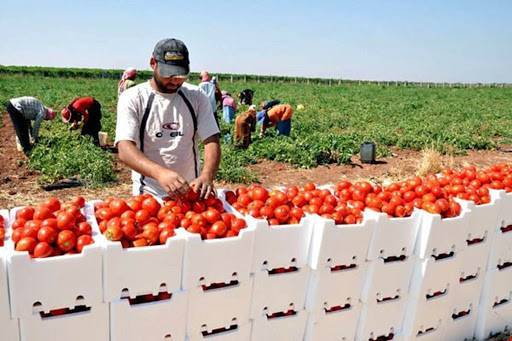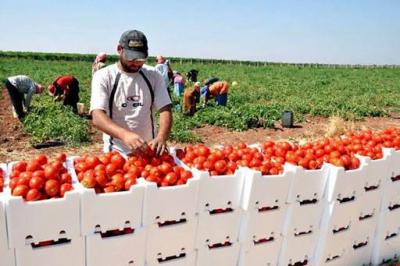Last weekend, Ibrahim Al-Tarshishi, head of the Farmers and Agricultural Workers’ Union, confirmed that "farmers will escalate their protests starting this week, with their initial action being the dumping of their trapped production in front of agricultural centers at the Port of Beirut and border crossings, extending to the Ministry of Agriculture in Beirut." Al-Tarshishi stated, "Thousands of tons of Lebanese fruits and vegetables are banned from export and entering hard currency due to the strike of employees. While we sympathize with their demands, we urge them to facilitate agricultural exports, and we cannot be held responsible for this economic collapse. What we are experiencing is catastrophic; we are besieged by the ban on exports, and we are also suffering from decisions by the Ministries of Economy and Agriculture regarding wheat cultivation. Farmers are marginalized, and no one wants to buy their produce, which they are prohibited from exporting."
Al-Tarshishi emphasized that "the absence of ministerial support is a hallmark of our reality on the eve of the agricultural harvest seasons, and we cannot turn seasons of abundance and blessings into fatal times for farmers. Those concerned must resolve the employee strike and purchase this season's wheat." Regarding updates on these issues, Al-Tarshishi explained to "Al-Markazia" that "after threatening to escalate, we felt some responsiveness and sympathy from the Minister of Agriculture and the General Director, as well as employees who announced their refusal to harm farmers, and they are striving to facilitate matters, especially for the clearance of goods at the port, airport, and borders. We may reach an agreement to work three days a week or more as needed, as an exception for the agricultural sector."
He stressed that "farmers thank public sector employees for their efforts and extend a hand to them to achieve their demands. We feel their pain and understand that their rights are compromised and their salaries are insufficient to cover travel expenses to their workplaces, and they have the right to protest. However, we cannot bear the damages and losses resulting from the closure of export doors for our goods due to the strike because public facilities cannot be closed for either exports or imports. Notably, importers' losses during 20 days of disruption exceed one million dollars for the containers at the port. Therefore, we affirm our refusal to close the crossings for Lebanese agricultural products prepared for export and to bar us from delivering them in a timely manner to our remaining customers who believe in Lebanese goods, all due to the employees' strike, whom we consider as part of our families. We ask them not to abandon us and to consider this situation as urgent and requiring immediate implementation, as we cannot bear the consequences, and the whole country cannot endure the closure to exports," he said, adding, "We have enough to bear."
He continued, "The agricultural sector is already suffering from the Syrian tax on Lebanese goods exported by land, while the state falls short in its efforts to remove it. This, alongside Saudi Arabia's closure of its markets and land transit routes from Jordan, prevents Lebanese agricultural products from reaching Gulf countries. Thus, we cannot endure more oppression and suffering due to the absence of employees. The greatest and most unprecedented damage and suffering in the history of the country and the agricultural sector is that the price of diesel fuel has reached 28 dollars, which the farmer must secure in cash, and his suffering cannot be described, especially since the costs have become dollarized, while he is probably the only one in the country who sells his goods in Lebanese pounds and trades in the national currency, bearing the rising dollar exchange rate in the black market."
He pointed out, "The sector is facing a setback represented by some traders fleeing from purchasing and receiving the harvest from farmers, which has led to a decrease in prices, and we hope to remedy this issue within days." As for the offer to sell wheat that farmers made to the state, Al-Tarshishi revealed that "all officials are turning a blind eye and do not care whether it is the Ministry of Economy, Agriculture, or any other party. We made an offer to the state to deliver wheat at a price 100 dollars lower than the global price, and we requested that the mills be allowed to receive from us and settle accounts with the state. However, we received no response or clear answer despite all the reviews we conducted. We do not know how to market our wheat crop, whether to export it or sell it unlawfully... and official bodies are absent to guide us," asking, "Will wheat exports be allowed? While we are pleading for it and paying for it in hard currency abroad, no matter the price."
Regarding the prices of vegetables and fruits, he confirmed that they are "very low, and after harvesting production in the Bekaa region, prices have dropped and do not cover costs because stagnation is prevalent, especially in light of the large gap between consumer purchasing power and production expenses. We see both parties in suffering; neither the first can bear the prices nor the second recoups his costs."




